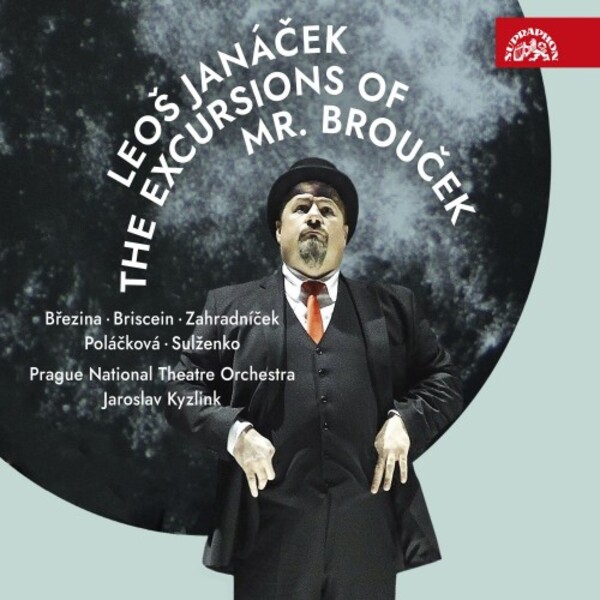JANÁČEK The Excursions of Mr Brouček (Kyzlink)
View record and artist detailsRecord and Artist Details
Genre:
Opera
Label: Supraphon
Magazine Review Date: 09/2024
Media Format: CD or Download
Media Runtime: 131
Mastering:
DDD
Catalogue Number: SU43392

Tracks:
| Composition | Artist Credit |
|---|---|
| (The) Excursions of Mr Broucek |
Leoš Janáček, Composer
Ales Briscein, Mazal; Blankytný; Petřík, Tenor Alžběta Poláčková, Málinka; Etherea; Kunka, Soprano Doubravka Souckova, Young Waiter; Child Prodigy; Student, Soprano Frantisek Zahradnicek, Sacristan; Lunigrove; Domšík, Bass-baritone Jaroslav Brezina, Matej Brouček, Tenor Jaroslav Kyzlink, Conductor Jiri Bruckler, Svatopluk Čech; Vacek the Bearded; First Taborite, Baritone Jirí Sulzenko, Würfl; Wonderglitter; Councillor, Bass Josef Moravec, Painter; Glorious Rainbow; Second Taborite, Tenor Martin Srejma, Composer; Harper; Miroslav, Tenor Prague National Theatre Chorus Prague National Theatre Orchestra Roman Janál, Poet; Cloudy, Baritone |
Author: David Patrick Stearns
Surreal? Avant-garde? Or just sloppy? In the booklet notes for this new recording of The Excursions of Mr Brouček, annotator Ondřej Hučín gives listeners permission to take all three positions at different points. And yes, it’s OK to be bewildered by Janáček’s antic, absurd, strangely marvellous comedy that has too much of everything for its own good – characters (30), plot (two spiralling stories) and musical collage elements (choruses from nowhere, gleefully interruptive percussion and satirical bourgeois waltzes). But the sheer abundance of it all (singers often switch between three different roles) makes the opera one of the most virtuosic theatre scores of the 20th century – in the life of a composer whose works are all one of a kind. Written roughly between 1908 and 1920, Mr Brouček reflects a more youthful composer than the later masterpieces.
What most likely keeps Mr Brouček from the international repertoire is the title character – an unambitious Prague landlord (name translation Mr Beetle) whose drunken hallucinations take him to the moon (Part 1) and back to the 15th century (Part 2), though with little consequence. His anti-charisma is reminiscent of the 1930s film comedian WC Fields, whose persona was based on a once-common but mostly extinct personality type whose charm is now elusive. Janáček is partly at fault for not giving Brouček more moments revealing human dimensions. He simply reacts, irritably, to the artsy moon inhabitants as well as to the quasi-historic figure in the opera’s more serious (and satisfying) second half. The majority of the opera is written in abruptly shifting, sometimes strident declamation so that charismatic voices aren’t needed or appreciated.
That said, I remain grateful for the live, 1959 German-language recording with stars Wilma Lipp, Kurt Boehme and Fritz Wunderlich, even though John Warrack’s 1995 review warned that the opera had been falsified in a number of ways. Similarly, I’m glad to have the live anglicised rough-but-ready English National Opera account from 1977 conducted by the great Janáčekian Charles Mackerras. The truly Czech recording for years was the authoritative but not-so-polished 1963 Supraphon recording conducted by Václav Neumann. West and East operatic forces came together in 2007 with a Czech cast and the BBC Symphony Orchestra under Jiří Bělohlávek in the Jiří Zahrádka critical edition. It’s so good that this new Supraphon set – also in the Zahrádka edition – seems a bit late to the party, partly because English-speaking listeners need DG’s translated libretto. Supraphon’s essay and plot synopsis are excellent, but not quite enough.
Orchestrally, Supraphon conductor Jaroslav Kyzlink better projects the opera’s more spontaneous, chaotic moments than the BBC Symphony and finds more meaning in the details. The two casts are evenly matched. DG’s Maria Haan has a vocal lustre that gives her portrayal of Etherea an edge, while Supraphon’s Aleš Briscein (in three roles but particularly Blankytný) has excellent text articulation and a thrilling voice. As for the Broučeks, it’s hard to say what makes a good one because never has a title-role been so easily lost in the crowd. In contrast to Mackerras’s pugnacious but effective Gregory Dempsey, the more hapless Czech counterparts distinguish themselves in different ways: Jan Vacík (DG) tends to sing the role sometimes mellifluously but I prefer (though not by much) Jaroslav Březina’s more declaimed approach on Supraphon for his dramatic commitment and ability to find meaning in a single note. Both sets are well recorded – the Supraphon less airy, revealing more grit – but are likely to leave listeners happily bewildered in equal measure.
Discover the world's largest classical music catalogue with Presto Music.

Gramophone Digital Club
- Digital Edition
- Digital Archive
- Reviews Database
- Full website access
From £8.75 / month
Subscribe
Gramophone Full Club
- Print Edition
- Digital Edition
- Digital Archive
- Reviews Database
- Full website access
From £11.00 / month
Subscribe
If you are a library, university or other organisation that would be interested in an institutional subscription to Gramophone please click here for further information.




